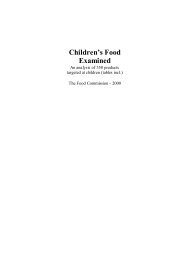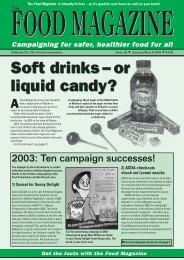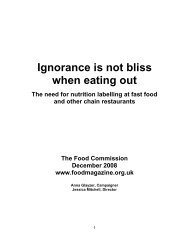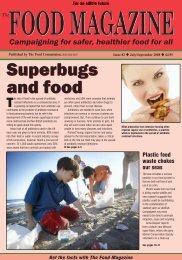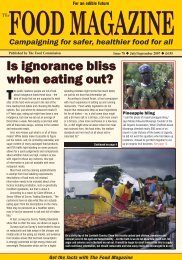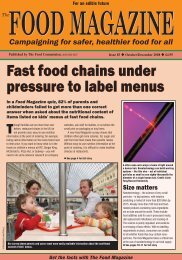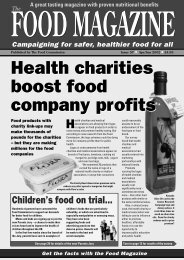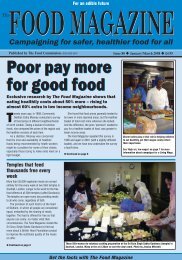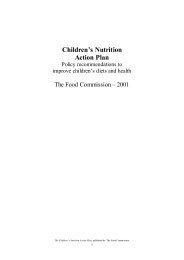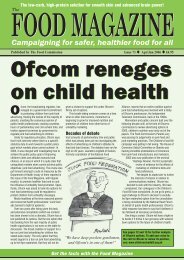Food Magazine - The Food Commission
Food Magazine - The Food Commission
Food Magazine - The Food Commission
Create successful ePaper yourself
Turn your PDF publications into a flip-book with our unique Google optimized e-Paper software.
advertising<br />
XNestlé complaint update<br />
<strong>The</strong> ASA ruled in favour of Nestlé after the<br />
<strong>Food</strong> <strong>Commission</strong> objected to an advert<br />
in a mother and baby magazine, showing a<br />
toddler's hand picking up Cheerio breakfast<br />
cereal, with the caption 'good eating habits are<br />
easy to pick up'.<br />
Cereal Partners UK (trading as Nestlé) said<br />
the ad would appear in Practical Parenting,<br />
Mother & Baby and Prima Baby magazines at<br />
regular intervals throughout the year. Bizarrely,<br />
the ASA compared the high level of sugar in<br />
Cheerios to the amount of sugar in 'half a small<br />
banana', perhaps not realising that dietary advice<br />
distinguishes between extrinsic sugars (free<br />
sugars) and intrinsic sugars (those locked up in<br />
cells, as in fresh fruit). <strong>The</strong>y also stated that<br />
whilst toddlers would receive a quarter of their<br />
daily intake of salt in a single serving of<br />
Cheerios, this would not be 'difficult to<br />
accommodate within a healthy diet for infants<br />
and children'.<br />
XPesticide dose ‘not proven’<br />
<strong>The</strong> ASA criticised an advert for Grove<br />
Fresh organic fruit juice headed 'Fruit<br />
juice now available in non-pesticide flavour',<br />
stating 'Every time you drink non-organic juice,<br />
you risk consuming a cocktail of chemical<br />
pesticide residues'. However, a surveillance<br />
report from the Government's Pesticides Residue<br />
Committee showed that, out of 120 samples of<br />
non-organic apple juice tested, only four<br />
contained pesticide residue. <strong>The</strong> ASA concluded<br />
that such evidence was not sufficiently robust to<br />
substantiate the implication that drinking nonorganic<br />
juice puts people at risk of consuming<br />
pesticide residues. <strong>The</strong> advertisers were advised<br />
not to use such claims again.<br />
Lindt retracts heart health claim<br />
XWhen we found a claim in BBC Good<br />
<strong>Food</strong> magazine that eating Lindt<br />
chocolate 'protects against heart<br />
disease', we promptly sent a complaint to the<br />
ASA. Disease risk reduction claims are<br />
explicitly prohibited under UK law, on the<br />
understanding that no single food can<br />
prevent or cure disease.<br />
<strong>The</strong> ASA wrote back<br />
saying that the <strong>Food</strong><br />
<strong>Commission</strong> should provide<br />
evidence that the claim was<br />
untrue, and that anyway it is<br />
not their job to deal with legal<br />
cases, but only with cases<br />
likely to mislead.<br />
We wrote back to say we<br />
were taken aback by this<br />
request, since we believed it incumbent on the<br />
advertiser to hold proof for such a strong<br />
claim as 'protects against heart disease', and<br />
that if Lindt felt confident to make claims that<br />
its product could prevent a disease, then it<br />
should apply for a medicines licence.<br />
<strong>The</strong> ASA wrote back to say that since the<br />
<strong>Food</strong> <strong>Commission</strong> is an 'industry body', their<br />
rules stated that we would have to provide<br />
evidence that the claim was untrue. This rule<br />
is presumably in place to prevent expensive<br />
investigations resulting from spats between<br />
rival companies.<br />
Last time such a difficulty came up, several<br />
years ago, we wrote to the ASA to explain that<br />
the <strong>Food</strong> <strong>Commission</strong> is not 'industry' and<br />
takes no money from industry – we represent<br />
the public. However, the ASA appears to have<br />
no category for 'public interest groups' on their<br />
database. So we wrote to the Medicines and<br />
Healthcare Regulatory Authority, which<br />
governs the rules for medicines and medicinal<br />
labelling, to say there is a chocolate<br />
manufacturer that appears to have come up<br />
with a product that can prevent heart disease;<br />
it should presumably have a<br />
licence, and what were they<br />
going to do about it.<br />
<strong>The</strong> MHRA were very<br />
pleasant, but several months<br />
on and we have heard nothing<br />
further.<br />
So we wrote to the trading<br />
standards officer responsible for<br />
Lindt, who has had a quiet word<br />
with the company, and they say<br />
they won't do it again. How nice.<br />
But meanwhile, the claim has been circulated<br />
to the 100,000 readers of BBC Good <strong>Food</strong><br />
magazine, and they will now presumably<br />
not hear<br />
anything to<br />
counteract<br />
the unproven<br />
claim that<br />
eating<br />
chocolate<br />
can prevent<br />
heart disease.<br />
We don't<br />
DARK CHOCOLATE IS GOOD FOR YOU!<br />
Dark chocolate is the healthiest way to<br />
satisfy a chocolate craving ...<br />
Protects against heart disease Eating<br />
50g a day of dark chocolate, with a<br />
minimum content of 70% chocolate<br />
solids, can be beneficial to your blood<br />
pressure and cardiovascular system.<br />
always agree with the processes and rulings<br />
of the ASA, but they do possess one effective<br />
weapon: bad publicity for bad claims.<br />
‘White Van Man' in the bag<br />
Paper bags have become yet another place to<br />
put marketing messages. This one came<br />
wrapped around a cheese and salad sandwich,<br />
from a sandwich shop in Islington. It reads like a<br />
rather poignant modern-day poem: 'Overslept.<br />
Late for work. Grab a quick bagel. Sifting junk<br />
emails. Endless presentations. Get quick burger.<br />
Rushing rushing rushing. Stuff office. Chocolate<br />
energy boost. Painful shoes. Endless roadworks.<br />
Sorry for the delay. Grab a coke.'<br />
<strong>The</strong> marketing message that emerges is: if<br />
you live a life like this, then you need Rennie<br />
indigestion tablets.<br />
Or perhaps a chance to slow down, rethink<br />
your life and enjoy better food…<br />
Bag Media, the company that arranges for<br />
marketing messages to be put onto paper bags,<br />
boasts that it has put advertising campaigns on<br />
more than a billion pieces of packaging – 'from<br />
Microsoft to Mars'. According to Bag Media, a<br />
sandwich bag such as the one for Rennie targets<br />
'ABC1 office workers'.<br />
However, the company<br />
can also offer specially<br />
targeted bag distribution<br />
to appear on<br />
'Café/greasy spoon<br />
bacon buttie bags',<br />
described as a '<strong>The</strong><br />
perfect media to target<br />
White Van Man. Media<br />
is collected and taken<br />
back to cab / car and placed on dashboard.'<br />
And what products does Bag Media<br />
recommend are promoted to Café/Greasy Spoon<br />
Bacon Buttie White Van Man <strong>The</strong> company<br />
says: 'This unique media is perfect for<br />
promoting confectionery and snacks, drinks or<br />
convenience products for those on the move.'<br />
<strong>The</strong> example the company gives is a bag with an<br />
advert for Snickers bars: 'Encouraging people to<br />
pick up a Snickers with their snacks.'<br />
<strong>The</strong> company also arranges for samples of<br />
products to be put into the bags with any<br />
products purchased. Sachets of Hellmann's<br />
Mayonnaise, for example, were distributed to<br />
fish & chip shops across the UK when the<br />
manufacturer Best <strong>Food</strong>s advertised on 12<br />
million fish & chip takeaway bags in support of<br />
its TV campaign.<br />
<strong>The</strong> aim was evidently to encourage<br />
consumers to try their chips dipped in extra fat.



